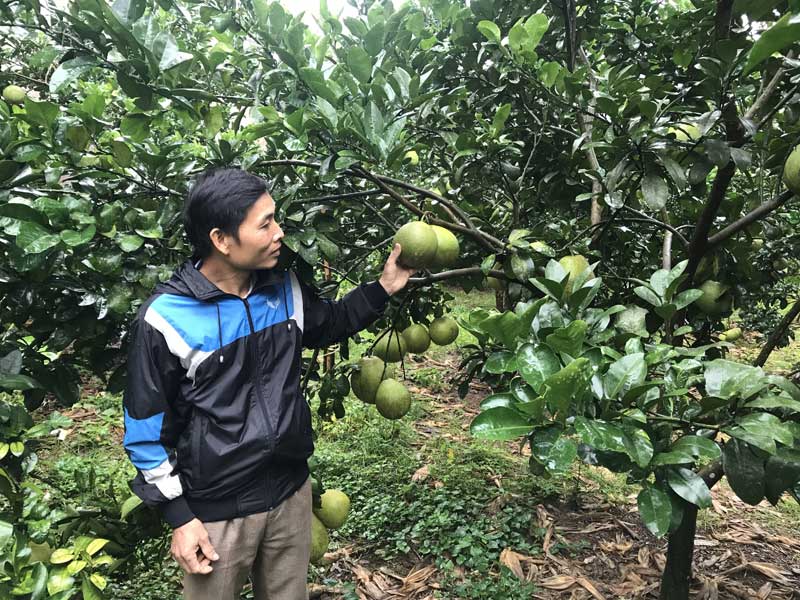
(HBO) – Party members in Cao Phong district have been pioneering and setting examples in the patriotic emulation movement, building of new style rural areas, and local socio-economic development programmes.
 Bui Van Chinh, Secretary of the Party cell in
Dung Tien hamlet, Dung Phong commune, pioneers cultivation shifting. His family
has earned stable income by shifting to the cultivation of sugar canes, grape
fruits and oranges in an area of more than 1.2 hectares.
Bui Van Chinh, Secretary of the Party cell in
Dung Tien hamlet, Dung Phong commune, pioneers cultivation shifting. His family
has earned stable income by shifting to the cultivation of sugar canes, grape
fruits and oranges in an area of more than 1.2 hectares.
As an exemplary party member, Bui Van Chinh, Secretary of the Party cell in
Dung Tien hamlet, has been responsible for his entrusted missions, and pioneered
in new work. In 2013, he donated more than 150 square metres of land to enlarge
rural road under the new-style rural building programme. Following Chinh, many
party members like Bui Van Khinh and Bui Van Thien, and other locals donated
over 4.100 square metres of residential and agricultural land to build public
works, contributing to help Dung Phong become the first new-style rural commune
in Hoa Binh province.
Regarding economic development, Chinh was a pioneer of shifting 0.6 hectare of
land to planting high economic value crops like sugar cane, orange and grapefruit
in 2002. His family gains 120 million VND in profit each year from 1 hectare of
sugarcane and over 2,000 square metres of orange and grape fruit.
To date, as most of the households in Dung Tien hamlet move to plant high value
trees, the local per capita income reaches 45 million VND each year while
poverty rate falls to 9.8 percent.
While in Tay Phong commune, Secretary of Party cell of Bam hamlet Bui Thanh
Nhay donated nearly 700 square metres of land to build new-style rural works
such as roads, markets and playground. Outstanding party members of new-style
rural area building programme in Hop Phong commune are Bui Quang Be, Bui Xuan
Tinh and Bui Van Linh. Particularly, war veteran Bui Van Ty in Ru Moi commune
donated some 1,400 square metres of land to build medical stations, schools and
roads. Ty is also a role model in studying and following President Ho Chi
Minh’s ideology, morality and style in the commune./.
In the spirit of "Party members go first, the people follow”, all households of Party members in the Doan Ket sub-region in Da Bac town, Da Bac district, voluntarily removed gates and fences, and donated land when the road expansion project passed through their properties. Inspired by their example, 68 households in the sub-region quickly followed suit, contributing over 1,400 sq.m of residential and perennial cropland to widen the main road through the residential area. The exemplary role of Party members in Doan Ket stands as a shining example of studying and following President Ho Chi Minh’s thought, morality, and lifestyle.
The Hoa Binh provincial People's Committee held a monthly meeting on May 29 to assess the implementation of socio-economic development tasks in the first six months of 2025, the progress of key projects, and some other important issues.
During his lifetime, President Ho Chi Minh always expressed his deep affection and special concern for children and youth. He once emphasized: "Caring for and educating children well is the responsibility of the entire Party and the entire people”; "First of all, the family (i.e. grandparents, parents, siblings) must do this job well”. "the Party Committees…, the Children’s Committee, the Youth Union, the education sector, and all related organizations must have specific plans to ensure children grow healthier and more progressive”. His teachings has been remaining valuable and serving as the guiding principles in the work of protecting, caring for, and educating children. In line with this ideology, Hoa Binh Province has continuously been prioritizing and investing resources in the well-being of children in recent years.
Mr. Nguyen Phi Long, the alternate Member of the Party Central Committee and Secretary of the Provincial Party Committee chaired the meeting of the Standing Committee of the Provincial Party Committee to provide opinions on several investment projects within the province. There was the attendance of Ms. Bui Thi Minh, the Permanent Deputy Secretary of the Provincial Party Committee and Chairwoman of the Provincial People’s Council; Mr. Bui Đuc Hinh, the Deputy Secretary of the Provincial Party Committee and Chairman of the Provincial People’s Committee and other members of the Standing Committee; the leaders from other departments, agencies, and some localities.
The Standing Board of the Vietnam Fatherland Front (VFF) Committee of Hoa Binh province held a meeting on May 28 to honour outstanding village elders, village heads, and reputable individuals from local ethnic minority and religious communities.
In mid-May, the provincial Museum organised an exhibition named "Duoi la co Dang Cong san Viet Nam quang vinh” (Under the flag of the glorious Communist Party of Vietnam). This meaningful activity took place in the joyful atmosphere to celebrate the country's major holidays and the Party congresses at all levels for the 2025-2030 term, towards the 14th National Party Congress.



 Bui Van Chinh, Secretary of the Party cell in
Dung Tien hamlet, Dung Phong commune, pioneers cultivation shifting. His family
has earned stable income by shifting to the cultivation of sugar canes, grape
fruits and oranges in an area of more than 1.2 hectares.
Bui Van Chinh, Secretary of the Party cell in
Dung Tien hamlet, Dung Phong commune, pioneers cultivation shifting. His family
has earned stable income by shifting to the cultivation of sugar canes, grape
fruits and oranges in an area of more than 1.2 hectares.